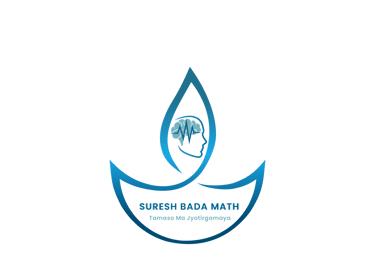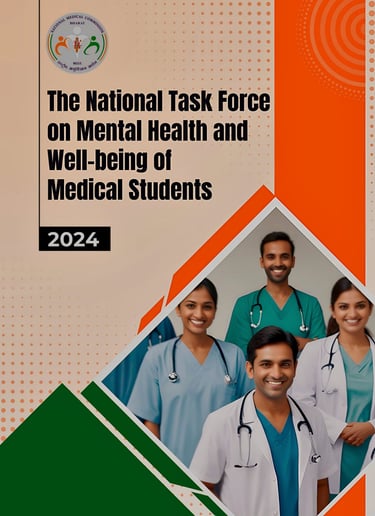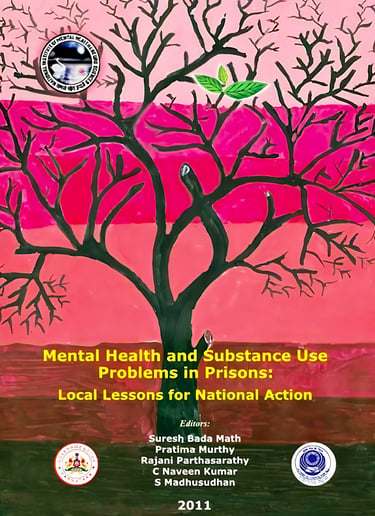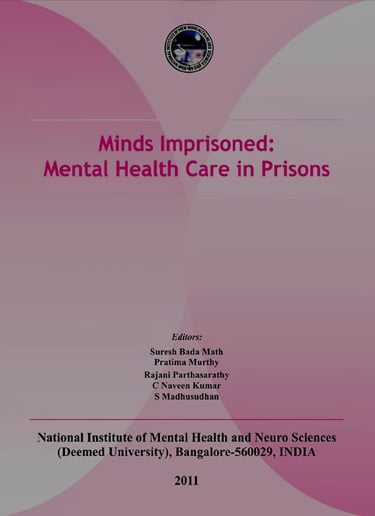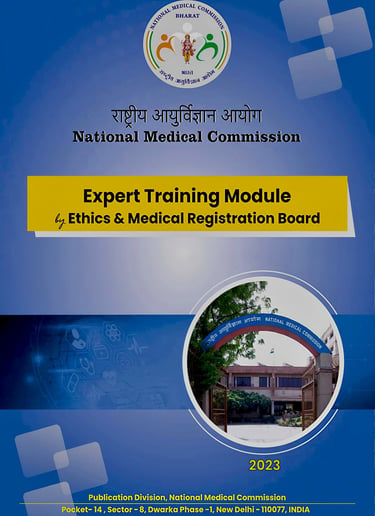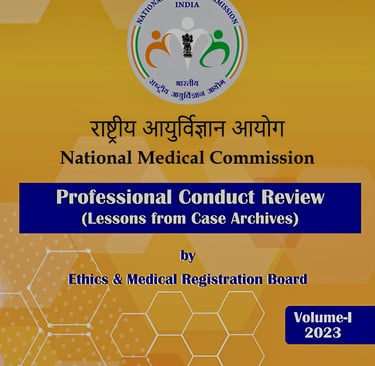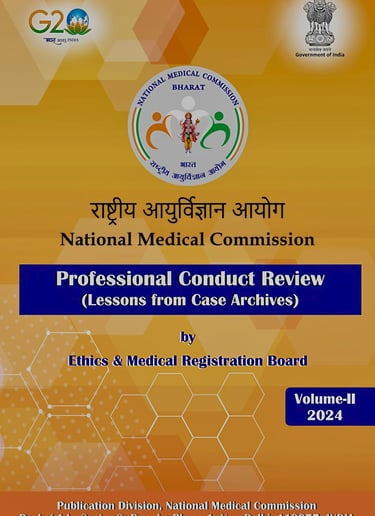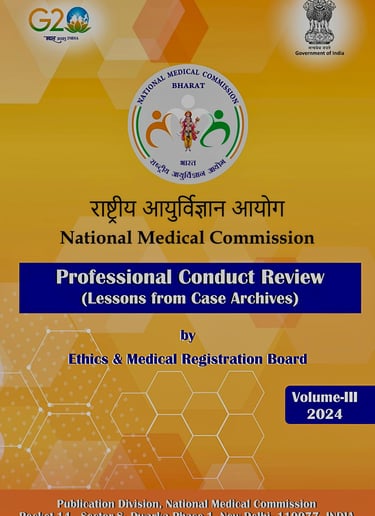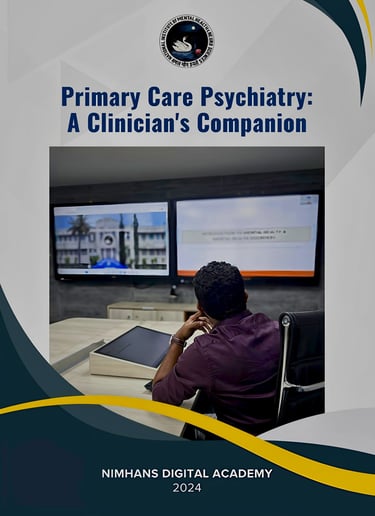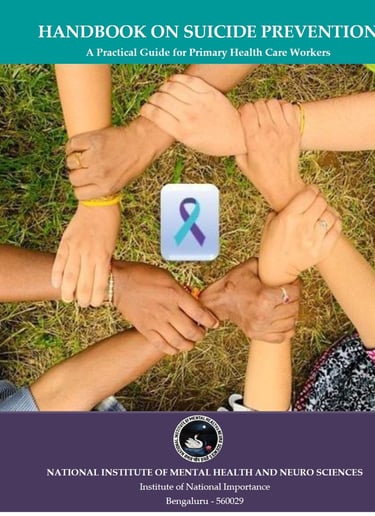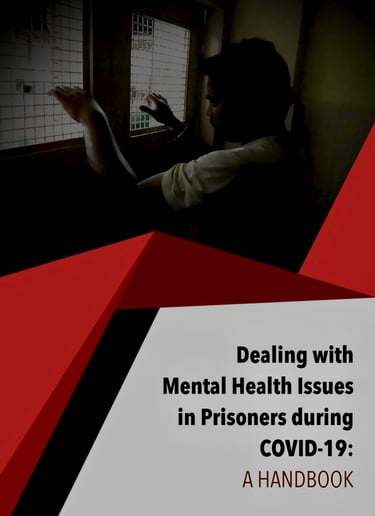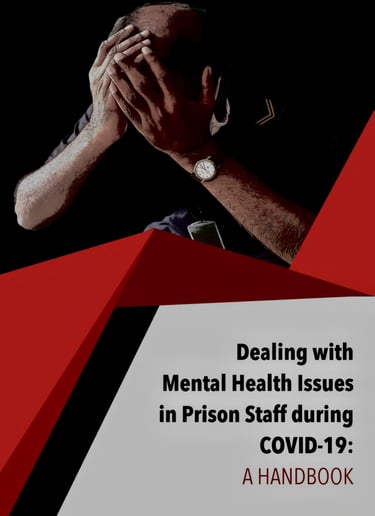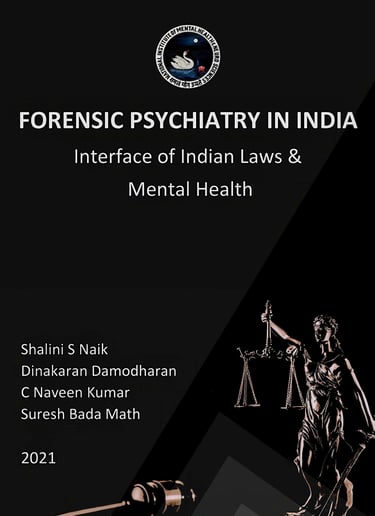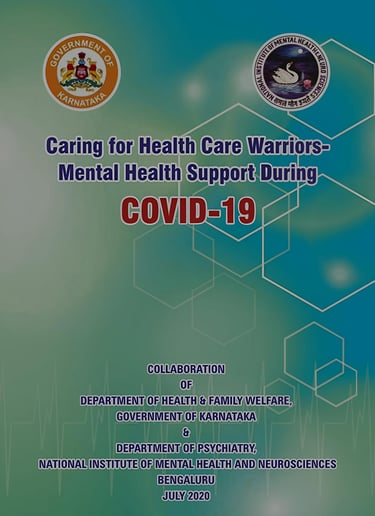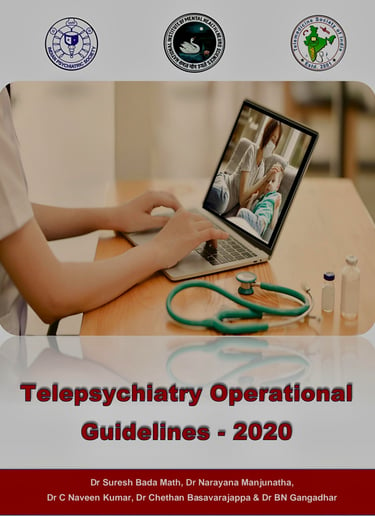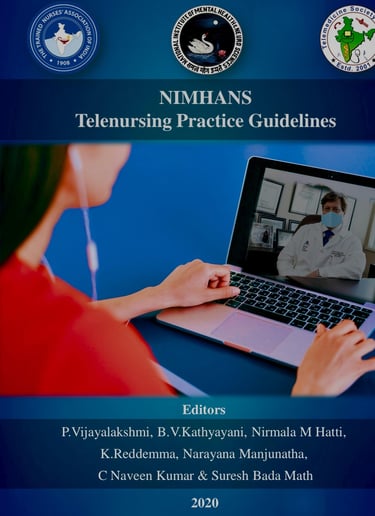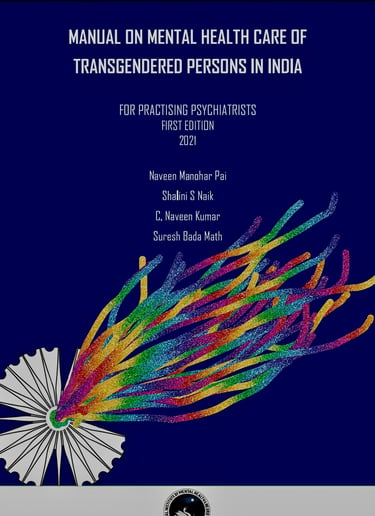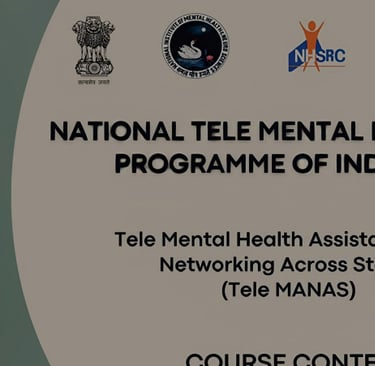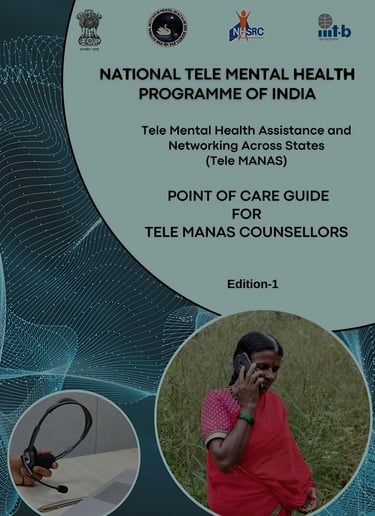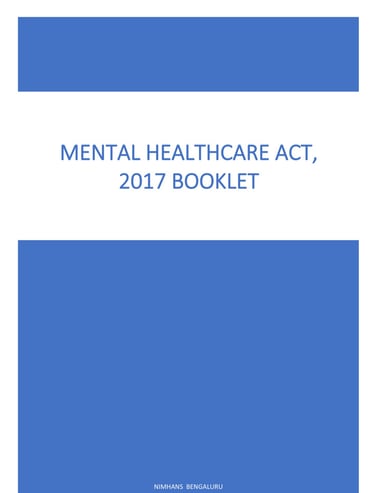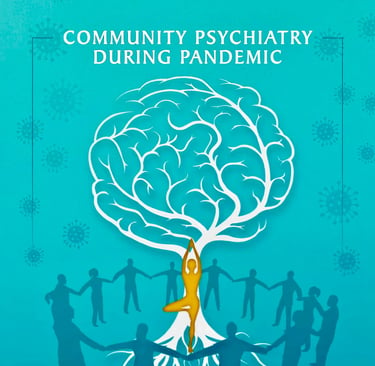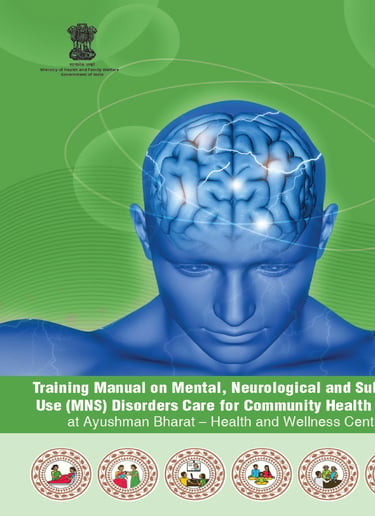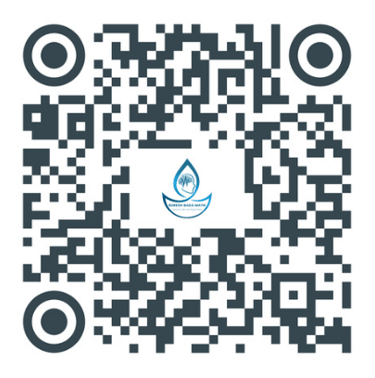Books
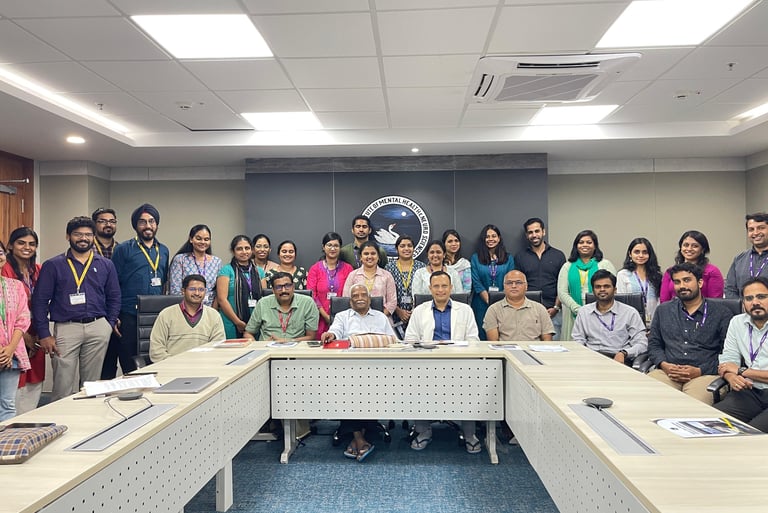

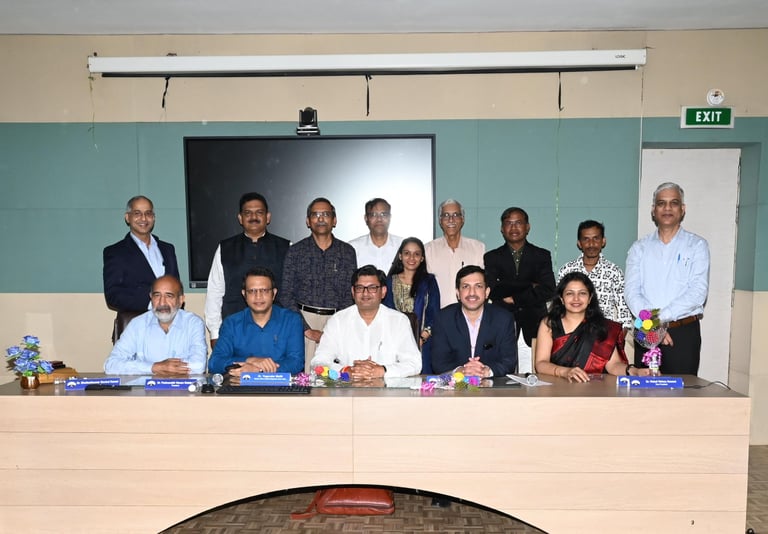

Books
The National Task Force on Mental Health and Well-being of Medical Students (2024) report by the National Medical Commission highlights the urgent need for mental health support in medical institutions. It calls for integrating mental health education, establishing mentorship programs, enhancing counseling services, conducting regular mental health screenings, and fostering supportive environments. These initiatives aim to reduce stigma, improve mental health awareness, and enhance the overall well-being of medical students
The Mental Health and Substance Use Problems in Prisons Study by NIMHANS, Bangalore, reveals alarming high prevalence rates of mental disorders and substance use among prisoners. The study highlights critical systemic gaps in mental health care within correctional facilities, calling for the implementation of specialized services, comprehensive staff training, policy reforms, and rehabilitation programs. These initiatives aim to improve inmate well-being, enhance mental health support, and reduce recidivism.
The NIMHANS report, "Mental Health and Substance Use Problems in Prisons: Local Lessons for National Action", highlights the critical burden of mental illness and substance use in prisons. The report advocates for systemic reforms, including comprehensive screening, increased treatment access, staff training, and policy implementation. It offers evidence-based insights that can shape national mental health strategies in correctional settings. By addressing mental health and substance use issues in prisons, the report calls for improved care, better outcomes for inmates, and a more rehabilitative approach to justice, ultimately enhancing public safety and reducing recidivism.
Mind-Imprisoned: Mental Health Care in Prisons is an academic review that explores the neglected mental health needs of incarcerated individuals, revealing high prevalence rates of mental illnesses and substance use disorders. It highlights systemic challenges, including inadequate resources, stigma, and a shortage of trained personnel. The review advocates for integrated care models, policy reforms, and rehabilitative approaches to address these gaps. By promoting holistic inmate well-being, it calls for a comprehensive strategy to improve mental health care in prisons, reduce recidivism, and ensure more effective rehabilitation and reintegration into society
The Expert Training Module by the Ethics & Medical Registration Board (NMC) is designed to equip medico-legal experts with essential knowledge and skills in ethical medical practice, patient rights, and assessing criminal professional negligence. The module provides valuable guidance for reporting to the SMC/EMRB/NMC. It emphasizes clinical decision-making, addressing medico-legal issues, improving communication skills, and ensuring strict adherence to ethical guidelines. By fostering accountability and integrity, this training module enhances the professional competence of medico-legal experts, ensuring they uphold high standards in medical practice and contribute to the fairness of the healthcare system.
Professional Conduct Review: Volume I by NMC outlines essential standards for ethical medical practice, focusing on professionalism, patient-centric care, and accountability. This volume includes case-based learning and in-depth discussions on decisions by the Ethics and Medical Registration Board (EMRB) at NMC. It offers practical insights into navigating ethical dilemmas, applying medical guidelines, and resolving complex ethical issues in real-world healthcare scenarios.
Professional Conduct Review: Volume II by the NMC advances ethical principles in medical practice, building on the success of Volume I. This volume addresses complex issues such as technology integration, interdisciplinary care, and medico-legal challenges. Featuring case-based learning from Ethics and Medical Registration Board (EMRB) decisions, it enhances critical thinking and practical application in real-world healthcare scenarios. A valuable resource for medical professionals, Volume II provides essential insights for navigating ethical dilemmas, improving interdisciplinary collaboration, and understanding the medico-legal landscape.
Professional Conduct Review: Volume III by the NMC builds on the successes of Volumes I and II, addressing emerging challenges in global health, technology, and ethics. This volume offers advanced case-based learning from Ethics and Medical Registration Board (EMRB) decisions, emphasizing adaptive, ethical, and culturally sensitive medical practices. It serves as a vital resource for medical professionals, offering valuable insights on maintaining professional conduct in the evolving healthcare landscape.
The Primary Care Psychiatry Clinician’s Companion, published by NIMHANS Digital Academy, is an essential guide for primary care providers addressing psychiatric conditions. It provides practical tools for mental health assessment, diagnosis, and treatment, covering common disorders like depression, anxiety, and substance use. This resource emphasizes collaborative care and mental health integration in primary care settings, improving patient outcomes and enhancing the role of healthcare providers in mental health management. Ideal for healthcare professionals seeking effective strategies for managing mental health in primary care, it promotes holistic and patient-centered care
The Handbook on Suicide Prevention: A Practical Guide for Primary Care Workers offers comprehensive guidance on suicide risk assessment, prevention strategies, and crisis management for healthcare professionals. This practical resource equips primary care workers with tools for early detection, intervention, and referral to specialized care, promoting mental health and suicide prevention.
Clinical Schedules for Primary Care Psychiatry (V2.4) provides a comprehensive framework for primary care providers managing psychiatric conditions. It includes structured schedules for mental health assessments, diagnosis, and treatment of common disorders such as depression, anxiety, and substance use. The guide emphasizes integrated care, patient-centered approaches, and effective communication in primary care psychiatry to improve outcomes and ensure holistic care
Dealing with Mental Health Issues in Prisoners during COVID-19 explores the heightened mental health challenges faced by incarcerated individuals during the pandemic. It highlights increased prevalence of anxiety, depression, and substance use disorders in prisoners. The report emphasizes the need for tailored mental health interventions, remote counseling, and systemic reforms to ensure adequate care, reduce stigma, and support inmate well-being during crises like COVID-19.
Dealing with Mental Health Issues in Prison Staff during COVID-19 addresses the psychological challenges faced by prison staff during the pandemic. It highlights increased stress, anxiety, and burnout among correctional officers and staff. The report emphasizes the importance of mental health support, resilience training, stress management strategies, and access to counseling services to maintain staff well-being and ensure effective prison operations during COVID-19
Forensic Psychiatry in India: Interface of Indian Laws & Mental Health explores the crucial intersection of legal frameworks and mental health in India. The report examines forensic psychiatry's role in criminal justice, mental health assessments, and the application of Indian laws in cases involving mental illness. It emphasizes the importance of mental health awareness in legal proceedings, improving the legal system's approach to mental health issues.
The COVID-19 pandemic has intensified mental health challenges, particularly in hospital settings. Effective guidelines for managing mental illness include enhancing patient care, ensuring psychological support for healthcare workers, and utilizing telemedicine for remote consultation. Hospitals must adopt mental health screening, provide crisis intervention, and ensure proper resources for anxiety, depression, and PTSD management during COVID-19.
The Handbook for Lay Counsellors provides essential guidelines for non-professional counselors to effectively support individuals facing mental health challenges. It covers foundational skills such as active listening, empathy, and communication techniques. The handbook emphasizes the importance of confidentiality, boundary setting, and recognizing signs of mental illness. It also offers practical advice on referral procedures, maintaining self-care, and managing stress, making it an invaluable resource for community-based mental health support.
The Telepsychiatry Operational Guidelines-2020 provide a comprehensive framework for delivering mental health services remotely. These guidelines emphasize the use of telemedicine to enhance access to psychiatric care, ensuring quality assessments, and secure consultations. They cover patient confidentiality, informed consent, technology protocols, and crisis management in telepsychiatry, offering essential guidance for practitioners and healthcare systems to provide effective mental health support. It also discusses legal and ethical issues during telemedicine practice.
The NIMHANS Telenursing Practice Guideline outlines protocols for delivering nursing care via telecommunication technologies. It emphasizes the importance of maintaining patient safety, confidentiality, and effective communication in remote settings. The guideline includes best practices for monitoring mental health conditions, providing emotional support, conducting virtual assessments, and ensuring follow-up care. It serves as a crucial resource for telenursing professionals, enhancing the quality of mental health services remotely.
The Child and Adolescent Mental Health: A Manual for Medical Officers provides practical guidance for diagnosing and managing mental health issues in children and adolescents. Covering common conditions like anxiety, depression, ADHD, and autism, it equips medical officers with evidence-based approaches, treatment strategies, and referral protocols. This essential manual is a must-read for primary care doctors to effectively manage psychiatric illnesses in young patients and improve mental health outcomes.
The Manual on Mental Health Care of Transgendered Persons in India offers comprehensive guidelines for addressing the mental health needs of transgender individuals. It highlights key issues such as gender dysphoria, stigma, discrimination, and the impact of social exclusion on mental well-being. The manual provides healthcare professionals with evidence-based practices for assessment, diagnosis, and treatment, ensuring a supportive and inclusive approach to transgender mental health care in India. It is an essential resource for promoting the mental well-being and rights of transgender individuals.
Caring for Healthcare Warriors: Mental Health Support During COVID-19 provides vital guidelines for supporting the mental health of healthcare workers during the pandemic. The report focuses on strategies to manage stress, burnout, anxiety, and depression, ensuring the improving resilience and emotional well-being of frontline workers. It emphasizes the importance of peer support, counseling services, and stress management techniques, aiming to foster resilience and well-being in healthcare professionals facing unprecedented challenges during COVID-19.
The Course Content for Tele MANAS Counsellors is designed to train professionals in delivering effective telemental health services. The curriculum covers key topics like communication skills, mental health disorders, crisis management, ethical standards, and technology use in telecounseling. It ensures counsellors are equipped to provide high-quality, remote mental health support, enhancing accessibility and improving outcomes for individuals seeking care.
The Facilitator's Manual for Trainers of Tele MANAS Counsellors provides comprehensive guidance for trainers to effectively teach telecounseling skills. It includes modules on communication, mental health disorders, crisis management, and ethical practices in telemental health. This manual equips trainers with the tools to teach counsellors how to provide remote, high-quality mental health support, ensuring effective telehealth services.
The Point of Care Guide Manual for Tele MANAS Counsellors offers essential tools for providing effective remote mental health support. It covers key aspects such as mental health assessments, crisis intervention, communication skills, and ethical guidelines in telecounseling. This manual ensures Tele MANAS counsellors are well-equipped to deliver quality care, enhance patient outcomes, and maintain confidentiality in telemental health services.
The Mental Healthcare Act 2017: Comprehensive Compilation of Forms provides a detailed collection of forms essential for compliance with mental health legislation in India. This compilation includes capacity assessment forms, admission (Sec 89/90) forms, and applications, ensuring adherence to legal and ethical standards. It serves as a practical resource for healthcare professionals to navigate the Mental Healthcare Act and uphold patients' rights.
Community Psychiatry for Junior Residents in Psychiatry is a comprehensive guide designed to provide foundational knowledge and skills in community-based psychiatry/mental health care. It covers topics such as community mental health programs, social determinants of mental health, stigma, and multidisciplinary team collaboration. This resource helps junior residents develop the necessary competencies to effectively address mental health issues in community settings. This book covers must know topics for MD Psychiatry students
The Training Manual on Mental, Neurological, and Substance Use (MNS) Disorders Care equips Community Health Officers at Ayushman Bharat – Health and Wellness Centres with essential skills for diagnosing and managing MNS disorders. It covers mental health, neurological conditions, and substance use disorders, providing evidence-based approaches, practical strategies, and referral protocols to enhance community-based healthcare delivery and improve patient outcomes.
The Manual on Students' Counselling for College Teachers equips educators with essential student counselling skills to support mental health in academic settings. It emphasizes stress management, effective communication, crisis intervention, and early detection of psychological issues. This guide empowers teachers to foster academic resilience and create a supportive learning environment for enhanced college well-being.
